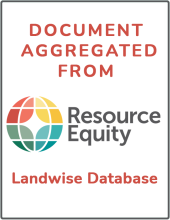Land Library Search
Through our robust search engine, you can search for any item of the over 73,000 highly curated resources in the Land Library.
If you would like to find an overview of what is possible, feel free to peruse the Search Guide.
/ library resources
Showing items 1 through 9 of 318.Are “informal real estate markets” really markets? Alternatively, are “informal property rights” tradable? A few years ago, just the mention of these concepts in a title would render it a misnomer.
Prolonged communal resource conflicts have undermined development and exacerbated poverty in North Wollo Amhara and neighboring Afar communities in Ethiopia for over two decades.
In Africa, particularly in Senegal, the issue of gender in land governance remains an equation when it comes to access to land.
Measuring and understanding gender differences in property rights is key to informing policy decisions and guiding investments aimed at fostering gender equality. However, there are a myriad ways of assessing property rights.
Context and Background:The Government of the Republic of Zambia has strengthened the policy and legal frameworks to support gender equality and women's empowerment.
Context and backgroundAccess to land and productive resources for women is low in many countries especiallyin the developing world where there are less secure property rights in general.
Although it is widely recognized that land tenure security is an integral part of agricultural intensification, there is no single clearly defined and universally applicable property rights regime to achieve this end.
This paper reviews the available data on men’s and women’s land rights, identifies what can and cannot be measured by these data, and uses these measures to assess the gaps in the land rights of women and men.





